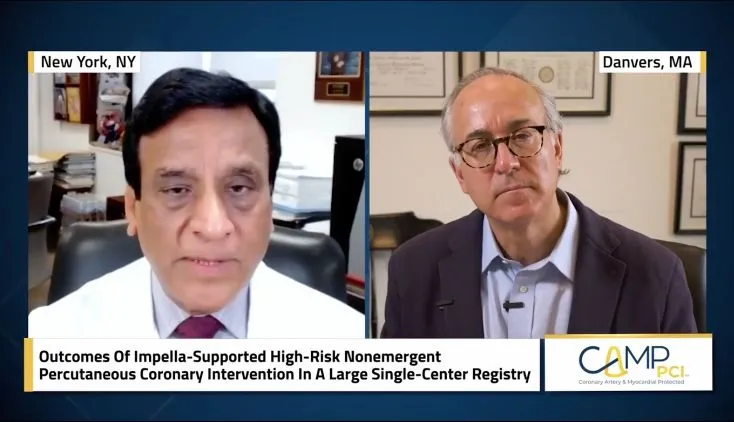Case Review, Protected PCI
Eric Rothstein: Competing Priorities in Anterior STEMI Case
Eric Rothstein, M.D., an interventional cardiologist at Dartmouth-Hitchcock Medical Center, discusses challenges he faced during an anterior STEMI case. The patient, a 73-year-old man, presented with sudden onset, substernal crushing chest pressure, diaphoresis and dyspnea while feeding his chickens.
Dr. Rothstein took the patient to the cath lab where initial angiography showed a high-grade distal left main (LM) lesion, ostial circumflex disease, culprit high-grade, calcific, mid LAD disease and a moderately diseased right coronary artery (RCA). After an impromptu heart team/shock team meeting with cardiac critical care and cardiac surgery concluded that high-risk PCI was the best solution for this patient, Dr. Rothstein explained, “In this situation I thought that supported PCI with an Impella CP® appeared to be appropriate.”
The first challenge Dr. Rothstein faced was that he could not cross the calcified LAD lesion. After several attempts, he finally wired it successfully with a Fielder XT. His next challenge was in the circumflex where, due to angulation and the degree of stenosis, he had difficulty wiring the LCX. Ultimately he used an angled microcatheter and workhorse wire.
Dr. Rothstein then had to deal with instability as the patient’s crushing chest pain intensified, Impella pulsatility was lost, and the patient’s mean arterial pressure dropped to 40 mmHg. Concerned about impending cardiac arrest, Dr. Rothstein removed the microcatheter, but the patient did not improve. After unsuccessful angioplasty from the LM into the LCX, he was able to complete angioplasty from the LM to the LAD, although there was still poor flow in the LAD and it was balloon uncrossable. In addition, he had lost access to the LCX when chest pain caused the patient to move.
At this point, Dr. Rothstein decided to focus on the LAD. He performed over the next three months, completed cardiac rehab. He is now asymptomatic and walking the dog, feeding the chickens, mowing the lawn, and preparing for hunting season.
Among the lessons learned from this case, Dr. Rothstein emphasizes that complex anatomy requires complex PCI techniques and severely calcified lesions require adequate lesion preparation. Mechanical circulatory support (MCS) can give operators the necessary time to achieve a durable result, especially when the operator has limited time in a decompensating patient.
Dr. Eric Rothstein is presenting on behalf of Abiomed and must present information in accordance with applicable regulatory requirements. This presentation includes Dr. Rothstein's opinions and findings based on their own knowledge and experience.
IMP-6453


